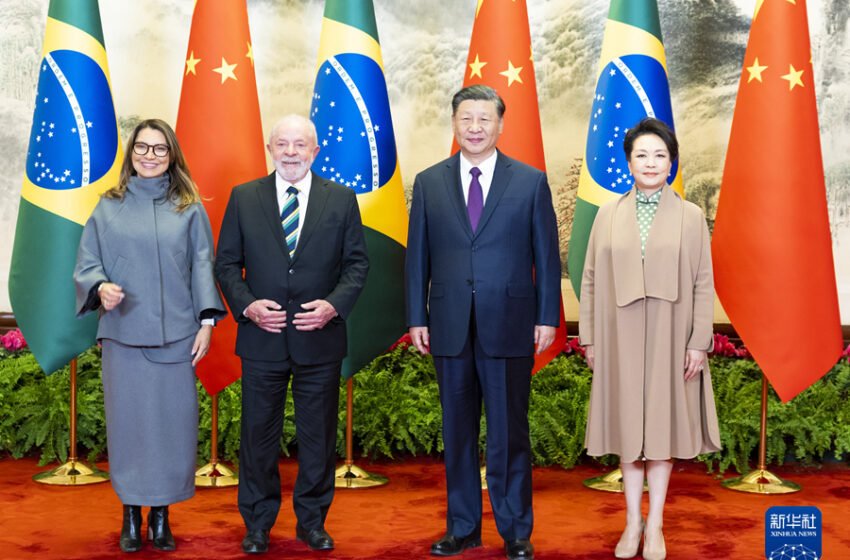China-Brazil Strategic Cooperation: Fostering Positive Diplomacy and Shared Prosperity

By Daniela Lopez
Editor’s Note: The writer is the Editor of Observer Diplomat an International Affairs and Diplomatic Magazine.
In a recent high-level summit held in Johannesburg, two prominent figures in international diplomacy, China’s newly appointed Foreign Minister Wang Yi and Brazil’s esteemed Chief Advisor to the Presidency Celso Luiz Nunes Amorim, came together for a pivotal meeting on July 24. The summit coincided with the significant 13th Meeting of BRICS National Security Advisers and High Representatives on National Security, which spanned from July 24 to July 25. Wang Yi’s participation in this event of paramount importance underscored the gravity of the occasion. Following the summit, Wang is scheduled to undertake an official tour to Nigeria, Kenya, and Turkey, further emphasizing the significance of this diplomatic encounter. As the curtain fell on this momentous gathering, the world now awaits the potential outcomes of their discussions and the opportunities for enhanced cooperation and shared progress on the international stage.
During this momentous meeting, Wang Yi ardently underscored the indispensable need to bolster strategic cooperation between these two illustrious emerging nations, situated in the eastern and western hemispheres. This collaboration carries the promise of propelling mutual interests, bolstering global progress, and advancing the very essence of democratizing international relations. Such a harmonious alliance between China and Brazil holds immense potential for nurturing shared prosperity and strengthening the foundation of positive diplomatic endeavors on the world stage.
While the prospects of China and Brazil developing strategic collaboration appear bright, there are worries about potential problems and repercussions that must be addressed. Critics claim that the increasing alliance will increase geopolitical tensions and have an impact on the interests of other emerging market economies and underdeveloped countries. China and Brazil must capitalize on their common strategic interests and establish mutual confidence.
Both nations play significant roles in shaping the global economy and have the potential to drive meaningful change through collaboration. By exploring more common interests and cooperative growth points, they can set an example for other emerging market countries, demonstrating the possibilities of solidarity and cooperation among developing nations.
Moreover, aligning China’s Belt and Road Initiative with Brazil’s reindustrialization strategy offers a unique opportunity to boost economic growth in both countries and beyond. This alignment can create a strong synergy, leading to infrastructure development, trade facilitation, and technology exchange, ultimately benefitting not just China and Brazil but also neighboring countries.
However, skeptics raise concerns about the potential implications of this alignment on other developing countries. They argue that such an alliance may result in a disproportionate focus on regions participating in the Belt and Road Initiative, potentially leaving other nations in Latin America and Africa at a disadvantage.
To address these concerns and ensure a balanced approach, China and Brazil must adopt a diplomatic tone and engage in open dialogues with other emerging market economies. By actively seeking to involve other developing countries in joint initiatives, they can foster inclusivity and build a more equitable global partnership.
Furthermore, the BRICS mechanism, serving as a platform for South-South cooperation, offers a unique opportunity for collaboration and shared growth among member nations. As China and Brazil represent pivotal BRICS countries, their enhanced communication and coordination can significantly contribute to the advancement of the group’s goals.
On the contrary, critics argue that this consolidation of power within the BRICS may undermine the effectiveness of the platform. They express concerns that decisions made by China and Brazil, as influential members, might not fully align with the interests of other less powerful BRICS nations.
To address these concerns, China and Brazil should demonstrate transparency in their intentions and actions within the BRICS framework. By actively involving other member states in the decision-making process and prioritizing the collective interests of all BRICS nations, they can ensure the platform remains effective and inclusive. China’s status as a strategic partner for Brazil and their existing fruitful cooperation underscore the potential for future collaboration. With a focus on aviation, automotive, high-tech, green economy, and climate change, the two nations can work towards shared goals, bringing about positive impacts for their economies and the global environment.
Notwithstanding the potential benefits of bilateral cooperation between China and Brazil, some critics express concerns about the need for Brazil to diversify its partnerships. They assert that an exclusive reliance on China may expose Brazil to economic and political vulnerabilities if the dynamics between the two countries undergo unforeseen changes.
In response to these valid concerns, it is advisable for Brazil to maintain active engagement with other strategic partners while simultaneously leveraging its collaboration with China to attract additional investment and technology transfer. By carefully striking a balance between bilateral and multilateral partnerships, Brazil can fortify its economic trajectory, ensuring greater stability and resilience in the face of potential challenges. Such a nuanced approach will allow Brazil to harness the positive aspects of its relationship with China while concurrently exploring new avenues for collaboration with other nations.
In a nutshell, deepening strategic cooperation between China and Brazil holds immense promise for both nations and the broader global community. By fostering mutual trust, aligning their strategic initiatives, and engaging with other emerging market economies, China and Brazil can set an example for solidarity and cooperation among developing countries. However, to maximize the positive impacts of their collaboration, they must address the concerns raised by critics and ensure inclusivity, transparency, and balance in their diplomatic endeavors. In doing so, they can contribute to a multi-polar world and the democratization of international relations, paving the way for shared prosperity and sustainable development.


